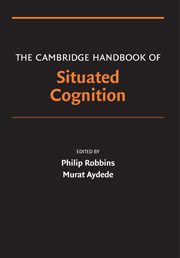Book contents
- The Cambridge Handbook of Situated Cognition
- The Cambridge Handbook of Situated Cognition
- Copyright page
- Contents
- Acknowledgments
- Contributors
- Part I Backdrop
- Part II Conceptual Foundations
- Part III Empirical Developments
- Chapter 11 Situated Perception and Sensation in Vision and Other Modalities
- Chapter 12 Spatial Cognition
- Chapter 13 Remembering
- Chapter 14 Situating Concepts
- Chapter 15 Problem Solving and Situated Cognition
- Chapter 16 The Dynamic Interactions between Situations and Decisions
- Chapter 17 Situating Rationality
- Chapter 18 Situativity and Learning
- Chapter 19 Language in the Brain, Body, and World
- Chapter 20 Language Processing Embodied and Embedded
- Chapter 21 Situated Semantics
- Chapter 22 Is Consciousness Embodied?
- Chapter 23 Emotions in the Wild
- Chapter 24 The Social Context of Cognition
- Chapter 25 Cognition for Culture
- Chapter 26 Neuroethology
- Index
Chapter 26 - Neuroethology
From Morphological Computation to Planning
from Part III - Empirical Developments
Published online by Cambridge University Press: 05 June 2012
- The Cambridge Handbook of Situated Cognition
- The Cambridge Handbook of Situated Cognition
- Copyright page
- Contents
- Acknowledgments
- Contributors
- Part I Backdrop
- Part II Conceptual Foundations
- Part III Empirical Developments
- Chapter 11 Situated Perception and Sensation in Vision and Other Modalities
- Chapter 12 Spatial Cognition
- Chapter 13 Remembering
- Chapter 14 Situating Concepts
- Chapter 15 Problem Solving and Situated Cognition
- Chapter 16 The Dynamic Interactions between Situations and Decisions
- Chapter 17 Situating Rationality
- Chapter 18 Situativity and Learning
- Chapter 19 Language in the Brain, Body, and World
- Chapter 20 Language Processing Embodied and Embedded
- Chapter 21 Situated Semantics
- Chapter 22 Is Consciousness Embodied?
- Chapter 23 Emotions in the Wild
- Chapter 24 The Social Context of Cognition
- Chapter 25 Cognition for Culture
- Chapter 26 Neuroethology
- Index
Summary
Keywords
- Type
- Chapter
- Information
- The Cambridge Handbook of Situated Cognition , pp. 480 - 504Publisher: Cambridge University PressPrint publication year: 2008
- 4
- Cited by



